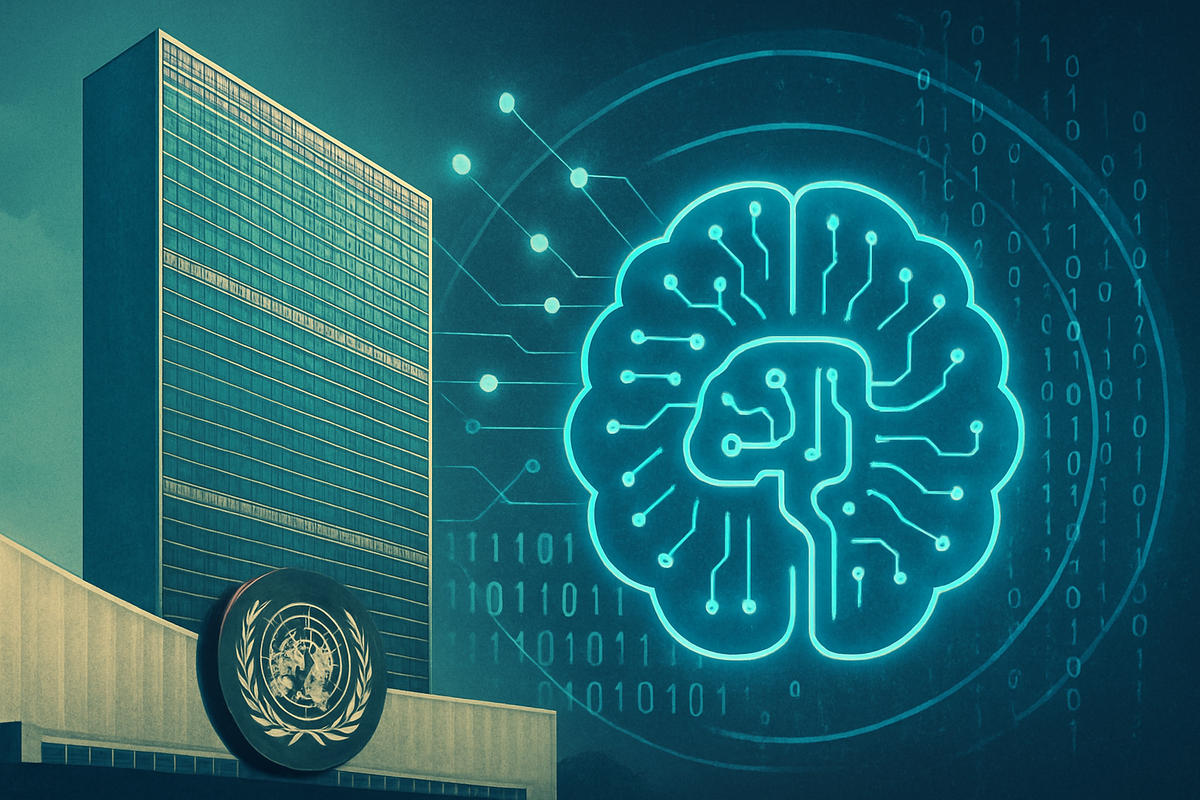
The United Nations has significantly escalated its efforts to establish a comprehensive global framework for Artificial Intelligence (AI) governance, urging member states to adopt universal rules for its responsible development and deployment. This intensified focus, underscored by recent General Assembly resolutions and the establishment of new international bodies, reflects a growing global consensus on the urgent need to harness AI's transformative potential while mitigating its profound risks, from exacerbating inequalities to posing threats to human rights and international security. The immediate implications include a heightened global discourse on AI ethics, a blueprint for international cooperation, and increased pressure on both national governments and private sector entities to align their AI strategies with human-centric principles and the Sustainable Development Goals.
The UN's proactive stance aims to prevent a fragmented regulatory landscape and ensure that the benefits of AI are shared equitably across the globe, particularly addressing the concerns of developing nations often excluded from current governance initiatives. This move signals a critical shift towards a more coordinated and inclusive approach, moving beyond mere discussions to the implementation of concrete mechanisms designed to guide the responsible evolution of AI technologies on a worldwide scale.
UN Security Council Grapples with AI's Dual-Edged Sword, Calls for Urgent Global Framework
The urgency of establishing a robust global framework for Artificial Intelligence (AI) governance was brought into sharp focus during a high-level open debate at the United Nations Security Council on September 24, 2025. Chaired by Republic of Korea (ROK) President Lee Jae Myung, the debate under the agenda item "Maintenance of international peace and security" saw member states grappling with AI's profound implications, acknowledging its immense potential for global good while simultaneously warning of its significant risks to international stability if left unchecked. This pivotal discussion followed earlier formal meetings on AI in July 2023 (hosted by the UK) and December 2024 (hosted by the US), underscoring a growing recognition within the UN's most powerful body that AI is no longer merely a technological issue, but a critical matter of global security.
During the debate, a broad consensus emerged that AI represents a "double-edged sword." Proponents highlighted AI's capacity to "turbocharge global development," strengthen peacekeeping missions through enhanced logistics and early warning systems, and advance human rights in areas like health and education. Conversely, numerous nations voiced grave concerns about AI's potential for misuse, including its ability to amplify bias, enable new forms of authoritarian surveillance, facilitate sophisticated cyberattacks on critical infrastructure, and spread disinformation that could destabilize societies and influence elections. A major point of contention and alarm was the prospect of lethal autonomous weapons systems (LAWS) operating without meaningful human control, with UN Secretary-General António Guterres explicitly warning against entrusting humanity's fate to algorithms and advocating for a legally binding ban on such systems by 2026.
While there was general agreement on the opportunities and challenges posed by AI, differing views emerged regarding the Security Council's precise role. Some members, emphasizing the Council's mandate to maintain international peace and security, argued for its active involvement in preventing AI from becoming a source of conflict. Others, notably Russia, cautioned against narrowly framing AI within a security context, advocating instead for broader discussions within the General Assembly and specialized forums to avoid duplication and ensure a more inclusive approach. Russia also expressed skepticism about "West-led rules" for AI governance, questioning the definition of "responsible use" and emphasizing the risk of AI deepening global inequality, particularly for developing nations. This concern was echoed by African members, who underscored the potential for AI to exacerbate the digital divide.
The Security Council's debate is intimately linked to the broader UN initiatives on AI governance. Secretary-General Guterres has been a consistent advocate for a global agency to oversee AI, emphasizing the need for international "guardrails." The discussions drew upon existing UN frameworks, such as the 2021 UNESCO recommendations on the Ethics of AI and the "Principles for the Ethical Use of Artificial Intelligence in the United Nations System" adopted in September 2022. Furthermore, the debate reinforced the necessity of the newer initiatives, including the "Pact for the Future" and its "Global Digital Compact (GDC)" adopted at the September 2024 Summit of the Future, which explicitly called for the establishment of an International Scientific Panel on AI and a Global Dialogue on AI Governance within the UN. The adoption of General Assembly Resolution A/RES/79/325 on August 26, 2025, formally establishing these two mechanisms, demonstrates the UN's commitment to translating these discussions into concrete action, aiming for a unified, human-centric approach to AI governance.
Corporate Landscape Braces for AI Governance Shake-Up: Winners and Losers Emerge
The United Nations' accelerating push for global AI governance is poised to send significant ripples through the corporate world, creating distinct winners and losers among public companies. As regulatory frameworks prioritize ethical AI, transparency, and accountability, businesses that proactively embed these principles into their operations will gain a substantial competitive edge, while those lagging in compliance could face severe financial and reputational repercussions. The UN's initiatives, including the General Assembly's unanimous resolution on AI in March 2024 and the "Global Digital Compact" adopted in September 2024, signal a clear direction towards a more regulated and responsible AI ecosystem.
In the realm of AI Development, hyperscale cloud providers are exceptionally well-positioned to thrive. Companies like Microsoft (NASDAQ: MSFT), Google (NASDAQ: GOOGL), and Amazon (NASDAQ: AMZN) are not only building the foundational AI infrastructure but are also integrating robust ethical AI principles, privacy safeguards, and governance tools directly into their AI-as-a-service offerings. Their ability to provide "governance-by-design" solutions through platforms like Azure AI, Google Cloud's Vertex AI, and AWS AI will be a key differentiator, attracting enterprises seeking compliant AI solutions. Conversely, smaller AI startups and companies heavily reliant on opaque "black box" AI systems, particularly in critical decision-making sectors, may struggle under the weight of new compliance requirements, potentially leading to consolidation or a shift towards more explainable AI (XAI) models.
The AI Hardware sector, the backbone of the AI revolution, will continue to see immense demand for high-performance components. Nvidia (NASDAQ: NVDA) remains a dominant force with its indispensable GPUs, while AMD (NASDAQ: AMD) is well-positioned to offer compliant alternative solutions. Key suppliers in the manufacturing chain, such as TSMC (Taiwan Semiconductor Manufacturing Company) and ASML Holding NV (AMS: ASML), will also benefit from the surging demand for advanced chips. However, geopolitical factors and export restrictions, particularly those impacting access to advanced AI chips for certain countries, could create challenges for these companies in specific markets, necessitating diversification and regional compliance strategies.
Cybersecurity companies and AI governance solution providers are set for substantial growth. The proliferation of AI-enabled threats and the stringent requirements for AI auditing, bias detection, and explainable AI will drive demand for specialized solutions. Companies like IBM (NYSE: IBM), with its long-standing focus on enterprise AI and governance, and cybersecurity giants such as CrowdStrike (NASDAQ: CRWD), Palo Alto Networks (NASDAQ: PANW), Fortinet (NASDAQ: FTNT), and SentinelOne (NYSE: S) are extending their offerings to AI model security and data integrity. Darktrace (LSE: DARK), known for its AI-powered autonomous response, is also well-positioned. The need for AI-powered compliance tools to automate regulatory monitoring and enhance risk management will also create significant opportunities across various industries.
Finally, Consulting firms are poised to be major beneficiaries. The complexity of navigating evolving global AI regulations will necessitate expert guidance, leading to increased demand for advisory services from firms like Deloitte, Accenture, McKinsey, BCG, PwC, EY, and KPMG. These firms are rapidly developing specialized AI ethics, risk assessment, and compliance capabilities, offering "product-consulting hybrids" to help clients implement responsible AI strategies. Their role in guiding enterprises through this new regulatory labyrinth will be critical, driving significant revenue growth in the coming years. While regulations might initially pose hurdles for innovation, especially for smaller players, a clear and globally coordinated framework could ultimately foster greater trust and accelerate ethical AI adoption, benefiting companies that prioritize responsible development.
A New Global Frontier: UN's AI Governance Push Reshapes Geopolitics and Industry Norms
The United Nations' assertive call for global AI governance marks a pivotal moment, signaling a collective international recognition that the technology's profound impact transcends national borders and necessitates a unified, coordinated response. This initiative, underscored by General Assembly resolutions in March and August 2025, aims to bring order and ethical considerations to a largely unregulated technological race, fundamentally reshaping broader industry trends, geopolitical dynamics, and future regulatory landscapes. The UN's emphasis on "safe, secure, and trustworthy" AI systems that promote sustainable development and human rights is not just a moral stance, but a strategic imperative to prevent the exacerbation of global inequalities and the digital divide, which currently concentrate AI's power and wealth among a select few nations and corporations.
This global push aligns with and reinforces existing industry trends towards "AI for Good" and ethical AI development. Companies are increasingly recognizing that trust and transparency are paramount for widespread AI adoption, and aligning with globally recognized frameworks will become a significant competitive advantage. The UN's focus on capacity-building in developing nations also addresses the growing need for diverse talent pools and expanded markets beyond traditional tech hubs, potentially fostering new partnerships and investment flows into emerging economies. The ripple effects on competitors and partners will be substantial: businesses will face intensified pressure to embed ethical considerations, data privacy safeguards, and robust risk management into their AI systems, creating a clear advantage for proactive, compliant firms and potentially harmonizing standards across fragmented markets.
From a regulatory and policy perspective, the UN's initiative, while currently non-binding, lays a crucial foundation for future national and regional legislation. These resolutions serve as a critical global consensus that will inform and influence AI laws worldwide, much like the GDPR reshaped global data privacy practices. A core implication is the insistence that AI systems must comply with international human rights law, leading to policies focused on ethical design, data privacy, and bias mitigation. The establishment of the Independent International Scientific Panel on AI and the Global Dialogue on AI Governance signifies the creation of new international bodies dedicated to providing evidence-based guidance and facilitating ongoing discussions, ultimately shaping the global AI agenda. However, the challenge of enforcement, particularly given the rapid pace of AI development and geopolitical rivalries, remains a key hurdle, with the mechanisms designed more for coordination and consensus than immediate, binding imposition.
Historically, the UN's efforts to govern AI draw parallels with international attempts to manage other transformative technologies. Comparisons are often made to the governance of nuclear technology in the mid-20th century, highlighting the need for careful control over high-stakes advancements, though AI's distributed, private-sector-driven nature presents unique challenges. The evolution of biotechnology and genetic engineering governance in the 1970s also offers insights into how scientific communities and broader constituencies can collectively shape policy. More recently, the UN's non-binding resolutions on AI governance are likened to climate accords or international trade frameworks, where the "soft power of norms can harden into real market rules." This suggests that while immediate legal enforceability may be limited, the establishment of shared principles and ongoing dialogue can eventually lead to more concrete international agreements and national regulations, representing an unprecedented, proactive effort to guide a technology with far-reaching societal implications.
Charting the Future of AI: A Crossroads for Global Development and Strategic Adaptation
The United Nations' fervent call for global AI governance heralds a critical juncture for the future trajectory of Artificial Intelligence, presenting both formidable challenges and unprecedented opportunities. In the short term, the newly established Independent International Scientific Panel on AI and the Global Dialogue on AI Governance will intensify global discussions, aiming to forge common understandings and norms, particularly concerning "AI red lines" – minimum guardrails to prevent the most egregious risks. A significant immediate focus will be on the urgent push to establish a legally binding instrument by 2026 to ban lethal autonomous weapons systems operating without human control, signaling a clear intent to rein in AI's most dangerous military applications. Corporations, in turn, are expected to proactively embed ethical frameworks, robust risk management, and accountability mechanisms into their AI development pipelines to anticipate and comply with emerging international standards.
Looking further ahead, the long-term vision is to cultivate a comprehensive, inclusive, and adaptable global governance framework that ensures AI serves all of humanity. This ambitious goal includes bridging the "AI capacity gap" between developed and developing nations, fostering equitable access to AI tools and education, and potentially establishing a dedicated AI Office within the UN Secretariat to oversee these global initiatives. The ultimate aspiration is to firmly anchor AI governance in the UN Charter and human rights frameworks, transforming current advisory initiatives into more robust international institutions with potential monitoring, reporting, and verification powers, akin to a global GDPR for AI. This will necessitate sustained international cooperation and multi-stakeholder engagement to build a truly universal and effective governance structure.
Governments worldwide will need to strategically pivot by developing coherent national and international regulatory frameworks that align with UN principles, prioritizing human control in AI applications, especially in the military domain. Active participation in the new UN AI bodies will be crucial for shaping global norms and standards. For developing nations, strategic investments in digital infrastructure, data capabilities, and skills development will be vital to harness AI's potential for sustainable development and avoid being left behind. Corporations, on the other hand, must adapt by making ethical AI practices, transparency, and accountability core tenets of their business models. Early adoption of these principles will not only ensure compliance but also foster trust, open new markets, and create opportunities in the burgeoning field of ethical AI solutions, auditing, and assurance.
The market landscape will see new opportunities emerge, particularly in developing AI solutions that align with the UN's Sustainable Development Goals, such as applications in healthcare, agriculture, and humanitarian response. A harmonized global framework could significantly reduce regulatory fragmentation, easing cross-border deployment of AI solutions and fostering international trade. However, challenges persist, including the short-term costs and uncertainties associated with an evolving regulatory environment, the risk of the digital divide widening if capacity-building efforts fall short, and the societal impact of AI-driven job displacement, which will demand proactive labor policies and massive investment in reskilling. The future of AI development and deployment hinges on which of three scenarios prevails: a cooperative and inclusive future where AI serves global good, a fragmented landscape that exacerbates disparities, or a scenario where governance lags, leading to escalating risks and undermining peace and human rights. The UN's initiatives are a decisive step towards steering humanity towards the first, more optimistic outcome.
The Dawn of Responsible AI: A Unified Global Vision for a Trillion-Dollar Market
The United Nations' recent, intensified push for global Artificial Intelligence governance marks a watershed moment, fundamentally reshaping how the world approaches this transformative technology. Spearheaded by the High-Level Advisory Body on AI (HLAB-AI) and solidified by General Assembly resolutions in March and August 2025, the UN has articulated a clear vision: to harness AI's immense potential for human progress while rigorously mitigating its profound risks. The "Governing AI for Humanity" report, a culmination of extensive global consultations, lays out seven critical recommendations, including the establishment of an International Scientific Panel on AI and a Global Dialogue on AI Governance, signaling a decisive move towards a human-centric, inclusive, and globally coordinated AI ecosystem.
The key takeaways from these initiatives are clear: AI governance must be global and inclusive, extending beyond fragmented national approaches to ensure equitable access and benefits for all 193 member states. A human-centric approach, rooted in human rights and the Sustainable Development Goals (SDGs), is paramount to prevent AI from exacerbating inequalities. The UN is actively addressing a significant "global governance deficit" by bringing underrepresented nations, particularly from the Global South, into the dialogue. While the UN's convening power is immense, its resolutions are currently non-binding, posing a challenge for enforcement in a rapidly evolving technological landscape. However, the establishment of new institutions and the emphasis on scientific consensus are crucial steps towards building a robust and adaptive governance framework.
Assessing the market moving forward, the UN's initiatives will undoubtedly intensify scrutiny on responsible AI practices. Companies that proactively integrate ethical AI, robust data governance, bias mitigation, and transparent accountability will gain a significant competitive edge, especially in sectors like life sciences and healthcare. The push for global standards and interoperability, though a long-term goal, could ultimately reduce regulatory fragmentation, easing cross-border operations for businesses. Furthermore, the strong link between AI and the SDGs will spur investment and innovation in "AI for Good" solutions, creating new markets and opportunities in areas like climate action, healthcare, and sustainable agriculture. While some regulatory overhead is inevitable, the UN's agile approach aims to balance innovation with risk mitigation, ensuring the projected $4.8 trillion AI market by 2033 serves a broader global good.
The lasting significance of the UN's involvement lies in its unique global legitimacy and its unprecedented effort to institutionalize multilateral oversight of AI. It lays the foundational architecture for future governance, shaping global norms around responsible AI and actively addressing geopolitical imbalances in AI development and access. For investors, this translates into a clear directive: prioritize companies with demonstrable, strong responsible AI frameworks, and conduct thorough due diligence on their data governance and ethical guidelines. Monitor the convergence and divergence of national and international regulations, and look for companies that actively contribute to inclusive AI development and SDG-aligned innovations. Be wary of "AI washing" and seek concrete evidence of ethical integration. The coming months, particularly with the nominations for the new Scientific Panel and further details on the operationalization of the HLAB-AI's recommendations, will be crucial in shaping the contours of the AI industry for decades to come, making informed and ethical investment strategies essential.
This content is intended for informational purposes only and is not financial advice





